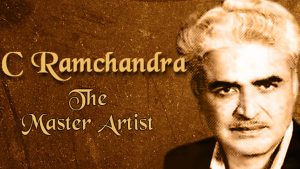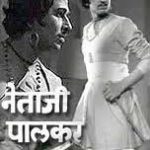 The Genius called C. Ramchandra
The Genius called C. Ramchandra
Ramchandra Narhar Chitalkar born on 12 January 1918 in Maharashtra was a renowned music composer in the cinema industry of India. He was famously known as C. Ramchandra. This genius had a multifaceted personality. Besides composing some of the brilliant songs in Hindi, Marathi, Tamil, Telgu movies, he acted, sang, and played instruments.
It is said that C. Ramchandra introduced rock ‘n’ roll in India even before it became a rage in the west. He was influenced by the Benny Goodman style of jazz clarinet. Benny Goodman was an American jazz and swing musician; he was clarinetist and a bandleader, known as the “King of Swing”. C. Ramchandra tried experimenting western and middle-eastern styles in his creations. His famous number from Shehnai released in 1947 ‘Meri jaan, meri jaan ana Sunday ke Sunday’ and his songs from the movie Albela released in 1951 “Shola jo bhadake’ and ‘Ye diwana, ye parwana’ are ever unforgettable even today almost after 50-60 years. These songs are played by youngsters in parties; they are superb, toe-tapping numbers. They are composed with bongo drums, oboes, clarinets, trumpets, saxophones, etc. The spirit of these songs conveys stimulation, enthusiasm, and hilarity. They make you dance and swing. And can we ever forget his ‘Ae mere watan ke logo’ sung by Lata and written by the great Kavi Pardeep.
I want to pay tribute to this great maestro for one thing – he is the one kind of unusual, great artist who used 5-6 names (identities) in his career span. When the world is deeply driven by sense of identity, I mean it is so important for all of us to tell the world ‘who we are’ this legendry composer for various reasons had to use 5-6 names. Those days, people abided by the contracts; once contract was signed with a company, the artist could not take up other assignments till the contractual period was over. C. Ramchndra who was such versatile man, lent music while acting in Marathi and Hindi movies or even played instruments for other composures. Hence he has many identities. When we see people going to any extent to maintain their identities, here is a multi-talented man who took chances in life. He was restless, inventive man who unleashed his talent all together.
in his career span. When the world is deeply driven by sense of identity, I mean it is so important for all of us to tell the world ‘who we are’ this legendry composer for various reasons had to use 5-6 names. Those days, people abided by the contracts; once contract was signed with a company, the artist could not take up other assignments till the contractual period was over. C. Ramchndra who was such versatile man, lent music while acting in Marathi and Hindi movies or even played instruments for other composures. Hence he has many identities. When we see people going to any extent to maintain their identities, here is a multi-talented man who took chances in life. He was restless, inventive man who unleashed his talent all together.
In the composer’s role, he mostly used the name C. Ramachandra, though he also used the names Annasaheb in the movies Bahadur Pratap, Matwale, and Madadgaar, Ram Chitalkar in the movies Sukhi Jeevan, Badla, Mr. Jhatpat, Bahadur, and Dosti, and Shyamoo in the movie Yeh hai duniya. Further, he often sang and acted in Marathi movies under the name R. N. Chitalkar. For his career as an occasional playback singer he used only his surname Chitalkar. Yes, this Chitalkar sang some renowned and unforgettable duets with Lata Mangeshkar such as ‘Kitna haseen hai mausam’ in film Azad or ‘Shola Jo bhadke’ in Albela.
It is noteworthy that although C Ramchandra was most commonly associated with lyricists Rajendra Krishan and Santhoshi. In Anarkali he worked with three lyricists, Krishan, Shailendra, and Hasrat Jaipuri. In his later he employed Noor Lakhnavi (Parchhain), Jan Nissar Akhtar (Yasmin), Pradeep (Nastik), Shakeel Bdayuni (Zindagi Aur Maut) and others. It is worth noting that despite the diversity of poetic sources, he maintained his original style while composing songs. I think that a good composer is essentially a sensitive person who understands poetry. He has to understand meaning of poetry, its environment before rendering music to it, which obviously C Ramchandra was.
 We often see that creativity is rarely acknowledged – this especially in cinema industry. The world suspects talent of creative people. Most people don’t actually like it. People are biased against creative people. Even people, who say they are looking for creativity, often react disapprovingly to creative ideas; because ambiguity is an inherent part of new ideas, and it’s also something that most people would do almost anything to avoid. We are a cruel society.
We often see that creativity is rarely acknowledged – this especially in cinema industry. The world suspects talent of creative people. Most people don’t actually like it. People are biased against creative people. Even people, who say they are looking for creativity, often react disapprovingly to creative ideas; because ambiguity is an inherent part of new ideas, and it’s also something that most people would do almost anything to avoid. We are a cruel society.
C. Ramchndra’s career went haphazard after mid 60s. Unfortunately his success story was cut short by many circumstances. The new entrants in the industry – new breed of composures with more energy, resources, the clout culture in cinema world all of this went against C. Ramchandra’s style of operating. Genius people have their principles – they will not go out of their way to please others. Occasionally, this brings them down; C.Ramchandra lost his ground to the newcomers. He died very young at the age of 64.
many circumstances. The new entrants in the industry – new breed of composures with more energy, resources, the clout culture in cinema world all of this went against C. Ramchandra’s style of operating. Genius people have their principles – they will not go out of their way to please others. Occasionally, this brings them down; C.Ramchandra lost his ground to the newcomers. He died very young at the age of 64.
The overtly competitive film industry in the world has numerous untold, tacit stories of great brilliant artists; they die or fade away but the masterpieces created by genius people remain eternal.













































